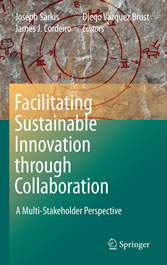Suchen und Finden
Mehr zum Inhalt

Facilitating Sustainable Innovation through Collaboration - A Multi-Stakeholder Perspective
"Chapter 3 Partnerships and Sustainable Regional Innovation Systems: Special Roles for Universities? (p. 41-42)
Martin Lehmann, Per Christensen, and Björn Johnson
Abstract The notion of Public–Private Partnerships (P3) is ambiguous. To date, however, there has been little emphasis on universities in this connection, and their roles (if any) are still somewhat unclear. The question we ask, therefore, is: What is or could be the role of universities in P3s? In this chapter, the first part is dedicated to the discussion and clarification of the concept of public–private partnerships. The role of universities if and when actively participating in ‘life outside the ivory tower’ is addressed. These partnerships are also discussed in a regional context.
With the point of departure in innovation theory, we combine ‘sustainable development’ with the Regional System of Innovation approach to propose a new concept – Sustainable Regional Innovation System – in which regional initiatives such as Public–Private– (Academic) Partnerships play an integrated role, not least in the context of ‘learning and innovation for sustainable development’.
Two cases are presented to underline the importance of what is signified as Public–Private–Academic Partnerships (PPAP); i.e., partnerships, where universities are given – or take on themselves – a specific role. In such partnerships, we argue, mediation is a major function of universities, including both the provision of new knowledge and the conciliation of opposing views, and universities thus act as catalytic and institutionalizing entities.
3.1 Introduction
Partnerships emerge through mutual trust and commitment and as a result of social relationships and power relations. In terms of sustainable development, partnerships, especially Public–Private Partnerships (P3), should be one of the new pivotal mechanisms of greening. The notion underpins the shift in regulatory regimes that, through political and ecological modernization, has been going on for more than a decade.
The World Summit on Sustainable Development (WSSD) in Johannesburg in 2002 actively promoted the establishment of such partnerships, which, on the one side, should revolve around sustainable development as a goal, and on the other, the voluntary collaboration between communities, governments, businesses and NGOs to achieve this goal.
The diversity and range of scholarship in the field is considerable and includes, for example, studies on partnerships in the US prison system (Schneider, 1999), global partnerships in health and for health development (e.g., Bazzoli et al., 1997; Buse & Walt, 2000), partnerships for urban governance (e.g., Pierre, 1998), partnerships for environmental management (e.g., Glasbergen, 1998, 1999; Manring, 2007), and partnerships for sustainable development (e.g., von Malmborg, 2003; Roome, 2001)."
Alle Preise verstehen sich inklusive der gesetzlichen MwSt.








